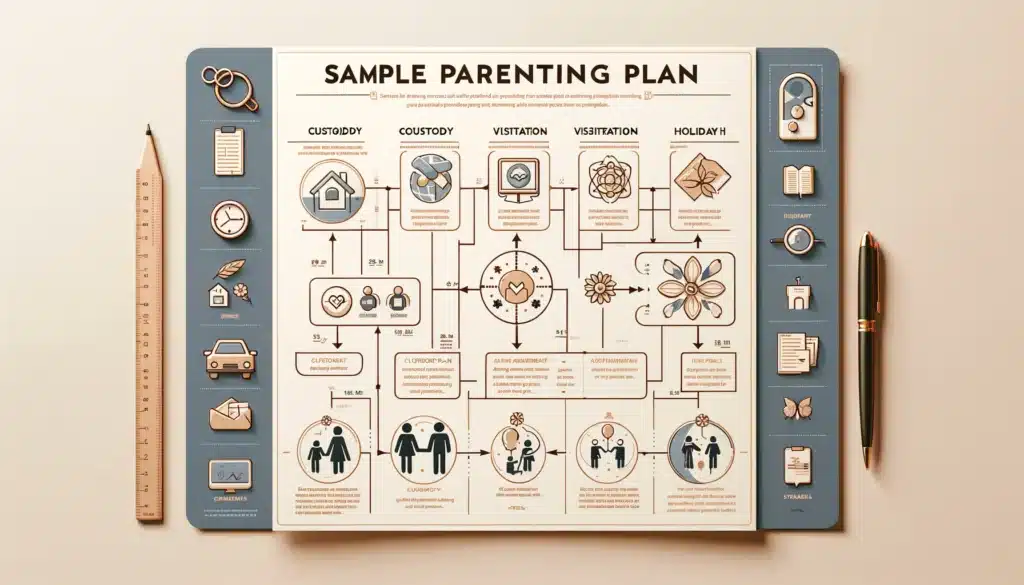Physical Address
304 North Cardinal St.
Dorchester Center, MA 02124
Physical Address
304 North Cardinal St.
Dorchester Center, MA 02124

Filing for divorce in Harris County, TX, can feel like navigating a complex labyrinth. It’s not just about completing legal forms; it’s a profound life event. You’re at a pivotal crossroads, where each decision shapes your future. In Harris County, the divorce process has its own unique set of challenges and protocols.
To move forward with clarity and confidence, understanding Harris County’s specific divorce laws is essential. This includes knowing the residency requirements and familiarizing yourself with the intricacies of the local court system. We’re here to guide you through this process, offering clear, actionable advice tailored to Harris County. Consider this your roadmap, designed to simplify a journey that might initially seem overwhelming.

Are you ready to embark on the divorce process in Harris County? Keep reading as we outline the essential steps, making your path forward clearer and more manageable. Let’s take this step together, moving towards new beginnings and brighter futures.
To get more info on filing for divorce in Texas, find a detailed overview in our article, How to File for Divorce in Texas.
Before proceeding, it’s important to note that obtaining legal advice from a qualified Harris County divorce lawyer is highly recommended. They can provide personalized guidance based on your unique circumstances and help ensure your rights and interests are protected throughout the divorce process.
In order to file for divorce in Harris County, Texas, you must meet certain residency requirements. These requirements ensure that you have a genuine connection to the state and the county. It is important to understand these requirements before initiating the divorce process.
In order to file for divorce in Harris County, you must fulfill the following residency requirements:
These requirements ensure that the divorce is filed in the appropriate jurisdiction and that you have a genuine connection to the state and county in which you are seeking the divorce. It is important to note that temporary absences from the state or county do not affect your eligibility to file for divorce. However, if you have recently moved to Harris County or Texas, you may need to provide documentation or evidence to establish your residency.
Understanding and fulfilling the residency requirements is essential when filing for divorce in Harris County, Texas. Failure to meet these requirements may result in your case being dismissed or delayed. It is always recommended to consult with a knowledgeable divorce attorney to ensure that you meet all the necessary requirements and navigate the legal process smoothly.
In Harris County, TX, there are two types of grounds for divorce: no-fault and fault-based.
No-fault divorce grounds in Harris County TX:
Fault-based divorce grounds in Harris County TX:
If you have made the difficult decision to file for divorce in Harris County TX, it’s essential to understand the necessary steps involved in the process. By following these steps, you can ensure a smooth and efficient divorce filing experience. Here is a comprehensive guide on how to file for divorce in Harris County TX:
By following these steps, you can navigate the divorce process in Harris County TX successfully. It is important to consult with an experienced divorce attorney or seek legal advice throughout the process to ensure your rights are protected and to make the process as smooth as possible.
If you’re considering filing for divorce in Harris County, TX, it’s important to understand the various fees associated with the process. Familiarizing yourself with the filing fees, court fees, and fees for additional services will help you plan and budget accordingly.
The specific amounts of these fees may vary depending on the nature of your case and the services required. It’s recommended to check with the Harris County Clerk’s Office for the most up-to-date fee schedule.
Payment methods accepted by the court clerk’s office typically include cash, credit/debit cards, money orders, and cashier’s checks. Personal checks may not be accepted, so it’s advisable to confirm acceptable payment methods in advance.
The working hours of the court clerk’s office may vary, so it’s best to check their official website or contact them directly to ensure you visit during their operating hours.
Keep in mind that these fees are separate from any legal representation or attorney fees you may incur during the divorce process. It’s essential to consult with a qualified divorce lawyer in Harris County, TX, to understand all the potential costs involved in your specific case.
| Description | Fee/Cost | Additional Information |
|---|---|---|
| Filing Fee for Petition for Divorce | Starts at $250-$300 | Additional costs for serving and copies. Payment accepted in cash, credit, money order, or cashier’s check. |
| Serving Spouse with Divorce Papers | Typically around $8 | – |
| Making Copies of Paperwork | Varies | Depends on the number of copies required. |
If you have any questions regarding the filing fees or need assistance with any aspect of the divorce process, don’t hesitate to reach out to the Harris County Clerk’s Office or consult with a knowledgeable divorce attorney.

In case you are facing financial hardship and are unable to afford the filing fees for your divorce in Harris County TX, you may be eligible to request a fee waiver. A fee waiver provides financial relief from the court by exempting you from paying the required fees.
To request a fee waiver, you will need to submit a statement form to the court. This form will ask you to provide information about your financial situation and demonstrate that you are unable to afford the fees. It is essential to be honest and accurate when filling out this form, as the judge will review your application and make a determination based on your financial hardship.
The judge will assess your financial situation and consider factors such as income, expenses, assets, and debts. It is crucial to provide any supporting documentation, such as pay stubs, bank statements, and evidence of financial obligations, to strengthen your case for a fee waiver.
If the judge approves your fee waiver request, you will be exempt from paying the filing fees for your divorce in Harris County TX. This can provide significant financial relief, especially during a time of financial difficulty.
It is important to note that fee waivers are granted based on financial need, and each case is evaluated individually. It is advisable to consult with a family law attorney or seek legal aid services to understand the specific requirements and process for requesting a fee waiver in your divorce case.
The image below summarizes the process of requesting a fee waiver for divorce in Harris County TX:
| Steps to Request a Fee Waiver for Divorce |
|---|
| 1. Fill out the statement form accurately and provide all necessary financial information. |
| 2. Gather supporting documentation, such as pay stubs, bank statements, and evidence of financial obligations. |
| 3. Submit the completed form and supporting documents to the court. |
| 4. The judge will review your application and make a determination based on your financial hardship. |
| 5. If your fee waiver request is approved, you will be exempt from paying the filing fees for your divorce in Harris County TX. |
By requesting a fee waiver, you can seek financial relief and ensure that the cost of filing for divorce does not create additional burden during already challenging circumstances. Make sure to follow the instructions provided by the court and consult with legal professionals for guidance tailored to your specific situation.
The court is located at:
201 Caroline St 3rd floor, Houston, TX 77002, United States
For more information about specific court locations and working hours, you can visit the official website of the Harris County District Clerk’s Office.

Filing for divorce without an attorney in Harris County, TX can be an option for couples who wish to navigate the process on their own. DIY divorce options provide individuals with the flexibility to handle their divorce proceedings without the need for legal representation.
One popular choice is to utilize online divorce services. These services offer a convenient way to access the necessary forms and guidance needed to complete the divorce process. By using online divorce services, you can save time and effort compared to traditional methods.
There are several benefits to using online divorce services. Firstly, they provide step-by-step instructions and comprehensive forms tailored to your specific circumstances. This ensures that you complete all the necessary documentation correctly and in accordance with Harris County, TX regulations.
Additionally, utilizing online divorce services can help streamline the process by providing access to legal support and consultation whenever needed. This can provide peace of mind and ensure that you have professional guidance throughout the divorce proceedings.
In conclusion, filing for divorce without an attorney in Harris County, TX is possible through DIY options, such as online divorce services. These services offer convenience, guidance, and support, making the divorce process more accessible and manageable for individuals.
To see how this process of filing for divorce in Harris County compares to that in other TX counties, check out our articles about how to file for divorce in Guadalupe County TX and filing for divorce in Hays County TX.